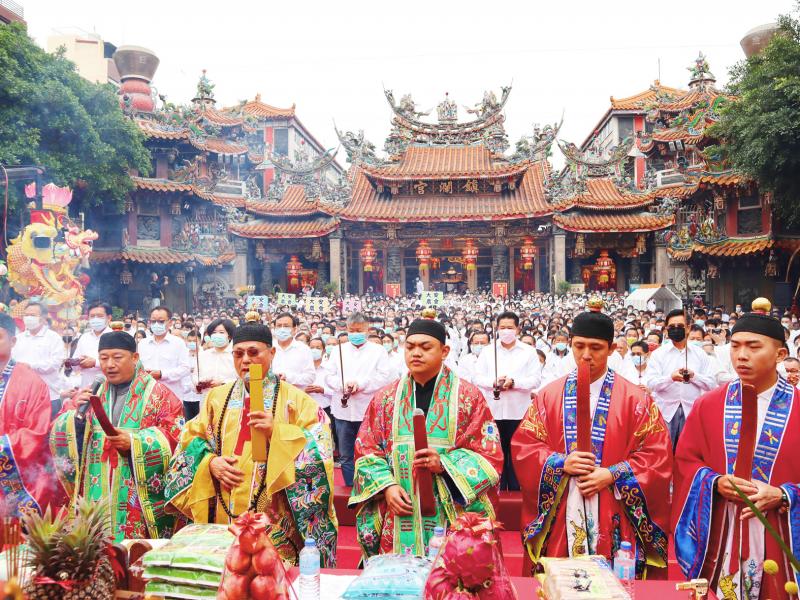Water levels in many of the nation’s reservoirs remain low, despite a weather system dumping significant rain in northern Taiwan last week.
Several major reservoirs in central and southern Taiwan, where the water shortage has been the most serious, were still at low capacity yesterday, Water Resources Agency (WRA) data showed.
As of 10am, the Baoshan Second Reservoir (寶二水庫), which provides water for the Hsinchu Science Park, was at 12 percent capacity.

Photo: Ou Su-mei, Taipei Times
Liyutan Reservoir (鯉魚潭水庫), which supplies water for Taichung and Miaoli County, and Zengwen Reservoir (曾文水庫) in Tainan, Taiwan’s largest reservoir, were at 15 percent respectively, the data showed.
Meanwhile, two major reservoirs in the north — Feitsui Reservoir (翡翠水庫) in New Taipei City and Shihmen Reservoir (石門水庫) in Taoyuan — were at 88 and 49 percent respectively, the data showed.
To cope with the drought, tap water pressure in Hsinchu County, Miaoli and Taichung has been lowered, and water would be trucked from Taoyuan to Hsinchu, the agency said.
Science and industrial parks in areas with no risk of land subsidence would be allowed to drill temporary wells, it said.
The wells would be sealed once the drought ends, WRA Deputy Director-General Wang Yi-feng (王藝峰) said.
However, former minister of economic affairs Yiin Chii-ming (尹啟銘) said that drilling wells might not help solve the issue, as groundwater levels fall during droughts, local Chinese-language media reported.
To appeal to higher powers amid the drought, the Irrigation Agency yesterday held a rain prayer ceremony at the Jenn Lann Temple (鎮瀾宮) in Taichung’s Dajia District (大甲), one of the nation’s largest temples where the sea goddess Matsu (媽祖) is worshiped.

COMPETITION: AMD, Intel and Qualcomm are unveiling new laptop and desktop parts in Las Vegas, arguing their technologies provide the best performance for AI workloads Advanced Micro Devices Inc (AMD), the second-biggest maker of computer processors, said its chips are to be used by Dell Technologies Inc for the first time in PCs sold to businesses. The chipmaker unveiled new processors it says would make AMD-based PCs the best at running artificial intelligence (AI) software. Dell has decided to use the chips in some of its computers aimed at business customers, AMD executives said at CES in Las Vegas on Monday. Dell’s embrace of AMD for corporate PCs — it already uses the chipmaker for consumer devices — is another blow for Intel Corp as the company

MediaTek Inc (聯發科) yesterday said it is teaming up with Nvidia Corp to develop a new chip for artificial intelligence (AI) supercomputers that uses architecture licensed from Arm Holdings PLC. The new product is targeting AI researchers, data scientists and students rather than the mass PC market, the company said. The announcement comes as MediaTek makes efforts to add AI capabilities to its Dimensity chips for smartphones and tablets, Genio family for the Internet of Things devices, Pentonic series of smart TVs, Kompanio line of Arm-based Chromebooks, along with the Dimensity auto platform for vehicles. MeidaTek, the world’s largest chip designer for smartphones

TECH PULL: Electronics heavyweights also attracted strong buying ahead of the CES, analysts said. Meanwhile, Asian markets were mixed amid Trump’s incoming presidency Taiwan Semiconductor Manufacturing Co (TSMC, 台積電) shares yesterday closed at a new high in the wake of a rally among tech stocks on Wall Street on Friday, moving the TAIEX sharply higher by more than 600 points. TSMC, the most heavily weighted stock in the TAIEX, rose 4.65 percent to close at a new high of NT$1,125, boosting its market value to NT$29.17 trillion (US$888 billion) and contributing about 400 points to the TAIEX’s rise. The TAIEX ended up 639.41 points, or 2.79 percent, at 23,547.71. Turnover totaled NT$406.478 billion, Taiwan Stock Exchange data showed. The surge in TSMC follows a positive performance

FUTURE TECH: Nvidia CEO Jensen Huang would give the keynote speech at this year’s Consumer Electronics Show, which is also expected to highlight autonomous vehicles Gadgets, robots and vehicles imbued with artificial intelligence (AI) would once again vie for attention at the Consumer Electronics Show (CES) this week, as vendors behind the scenes would seek ways to deal with tariffs threatened by US president-elect Donald Trump. The annual Consumer Electronics Show opens formally in Las Vegas tomorrow, but preceding days are packed with product announcements. AI would be a major theme of the show, along with autonomous vehicles ranging from tractors and boats to lawn mowers and golf club trollies. “Everybody is going to be talking about AI,” Creative Strategies Inc analyst Carolina Milanesi said. “From fridges to ovens